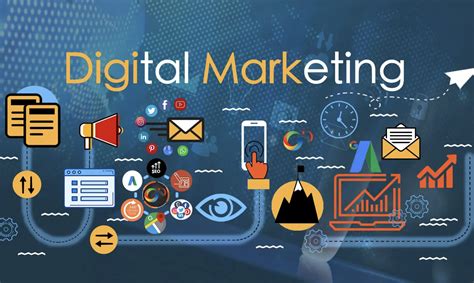In today’s fast-paced digital world, the role of a digital marketing specialist has become increasingly vital for businesses looking to thrive in the online space. From understanding the ever-evolving digital marketing landscape to mastering the intricacies of search engine optimization (SEO), there are numerous avenues for professionals to explore. Developing a strong digital marketing strategy, leveraging social media to reach new audiences, and creating engaging content are just a few of the essential skills required for success in this field. Additionally, harnessing the power of email marketing, embracing influencer collaborations, and utilizing data analytics to drive marketing decisions are crucial components of a digital marketer’s toolkit. In this blog post, we will delve into each of these subheadings to provide you with a comprehensive guide on becoming a digital marketing specialist in the modern age. Whether you’re a seasoned professional or just starting out in the industry, staying ahead of digital marketing trends and innovations is key to maximizing success in this dynamic field.
Table of Contents
Understanding the Digital Marketing Landscape
In today’s digital age, the marketing landscape is constantly evolving and changing. With the rise of technology and the internet, businesses have access to a wide range of digital marketing tools and platforms to reach their target audience. Understanding the digital marketing landscape is crucial for businesses to stay competitive and effectively reach their customers.
One of the key components of digital marketing is search engine optimization (SEO), which involves optimizing your website to rank higher in search engine results. This is essential for increasing visibility and driving organic traffic to your website. Additionally, social media has become a powerful marketing tool, allowing businesses to connect with their audience and build brand awareness.
Another important aspect of the digital marketing landscape is email marketing. Despite the rise of social media, email marketing remains a highly effective strategy for engaging with customers and driving conversions. Additionally, data analytics plays a crucial role in understanding customer behavior and making informed marketing decisions.
As the digital marketing landscape continues to evolve, it’s important for businesses to stay ahead of the latest trends and innovations. By understanding the digital marketing landscape, businesses can effectively leverage digital tools and platforms to reach their audience and achieve marketing success.
Developing a Strong Digital Marketing Strategy
When it comes to digital marketing, having a solid strategy is crucial for success. It’s not enough to just have a presence on social media or a website – you need to have a plan in place to reach your target audience and guide them through the customer journey.
One important aspect of developing a strong digital marketing strategy is understanding your target audience. You need to know who they are, what their pain points are, and how your product or service can solve their problems. This will help you tailor your marketing efforts to resonate with your audience and drive engagement.
Another key element of a strong digital marketing strategy is setting clear and achievable goals. Whether it’s increasing website traffic, boosting brand awareness, or driving sales, having specific, measurable objectives will help guide your marketing efforts and ensure that you’re on track to success.
Finally, it’s important to regularly evaluate and adjust your strategy based on the data and insights you gather. This means tracking key performance indicators, analyzing the results of your campaigns, and making data-driven decisions to optimize your marketing efforts.
Mastering Search Engine Optimization (SEO)
Search Engine Optimization (SEO) is a crucial aspect of digital marketing, as it directly impacts the visibility of a website in search engine results. The goal of mastering SEO is to improve a website’s ranking in search results, increase organic traffic, and ultimately drive more conversions. It involves optimizing the website’s content, improving its technical aspects, and building high-quality backlinks.
One key aspect of mastering SEO is conducting keyword research to identify the terms and phrases that potential customers are using to search for products or services. By understanding the most relevant keywords for a business, website owners can create content that is tailored to their target audience, increasing the likelihood of ranking higher in search results.
Another important aspect of SEO is on-page optimization, which involves optimizing individual web pages to improve their search engine rankings and drive organic traffic. This includes optimizing meta tags, headings, and content, as well as improving the site’s internal linking structure. Off-page optimization, on the other hand, focuses on building high-quality backlinks from authoritative websites to improve the website’s authority and relevance in the eyes of search engines.
In conclusion, mastering SEO is essential for any business looking to improve its online presence and drive more traffic to its website. By understanding and implementing the best practices for SEO, businesses can improve their search engine rankings, attract more qualified leads, and ultimately drive more conversions.
Leveraging Social Media for Marketing Success
Social media has become an essential tool for businesses to reach their target audience and drive marketing success. With platforms like Facebook, Instagram, Twitter, and LinkedIn boasting billions of active users, the potential for brands to connect with consumers is unprecedented. By leveraging social media effectively, businesses can increase brand awareness, drive website traffic, generate leads, and ultimately boost sales.
One of the key strategies for successful social media marketing is creating a strong and consistent brand image across all platforms. This involves using cohesive branding elements such as logo, color palette, and voice to create a unified presence that resonates with the target audience. Consistency is crucial for building brand recognition and trust among social media users.
Another important aspect of leveraging social media for marketing success is engaging with followers through valuable and relevant content. This can include sharing industry news, offering tips and advice, running contests and giveaways, and responding to comments and messages in a timely manner. By providing meaningful content and actively interacting with followers, businesses can build a loyal and engaged community around their brand.
In addition to organic content, businesses can also benefit from utilizing paid advertising on social media platforms. With advanced targeting options, businesses can ensure their ads are seen by the right audience, leading to higher conversion rates and a better return on investment. Paid social media advertising is a powerful tool for reaching new potential customers and expanding brand reach beyond the current follower base.
Creating Engaging and Effective Content
In today’s digital world, content is king. With so much information available at our fingertips, it’s crucial for businesses to create engaging and effective content in order to stand out from the competition. Whether it’s through blog posts, social media updates, videos, or infographics, the content you create plays a major role in attracting and retaining customers. It’s not just about having something to say, it’s about saying something valuable and compelling.
One key aspect of creating engaging and effective content is understanding your target audience. What are their pain points, interests, and preferences? By knowing your audience inside and out, you can tailor your content to meet their needs and provide them with the information and solutions they’re looking for.
Additionally, it’s important to keep your content fresh and relevant. The digital landscape is constantly changing, and what worked yesterday may not work tomorrow. Keep an eye on industry trends, news, and developments, and be prepared to adjust your content strategy accordingly.
Finally, don’t underestimate the power of storytelling. People are naturally drawn to stories, and weaving compelling narratives into your content can help create a strong emotional connection with your audience. Whether it’s sharing customer success stories, highlighting your company’s journey, or simply incorporating storytelling elements into your blog posts, leveraging the art of storytelling can greatly enhance the effectiveness of your content.
Harnessing the Power of Email Marketing
Email marketing has been a powerful tool for businesses to connect with their audience and drive sales. With the rise of social media and other digital marketing channels, some may argue that email marketing is becoming obsolete, but the reality is that it is still a highly effective strategy for reaching and engaging customers.
One of the key strengths of email marketing is its ability to deliver personalized and targeted content directly to the inbox of the recipient. This allows businesses to tailor their messaging based on the recipient’s interests, behavior, and demographics, leading to higher engagement and conversion rates. By segmenting their email lists and leveraging automation tools, businesses can ensure that their emails are relevant and timely, maximizing their impact.
Another benefit of email marketing is its ability to drive customer loyalty and repeat purchases. By regularly communicating with customers through email, businesses can nurture their relationships and build trust, ultimately leading to increased customer lifetime value. Moreover, email marketing allows businesses to showcase their expertise, share valuable content, and provide exclusive offers, further solidifying their relationships with customers.
Furthermore, email marketing provides measurable results, enabling businesses to track the performance of their campaigns and make data-driven decisions. Through analytics and tracking tools, businesses can gain insights into the open rates, click-through rates, and conversion rates of their emails, allowing them to optimize their strategies and improve their ROI.
Embracing Influencer Marketing to Boost Reach
In today’s digital age, influencer marketing has become an increasingly popular strategy for brands looking to expand their reach and connect with new audiences. By partnering with individuals who have a strong online presence and a dedicated following, businesses have the opportunity to tap into a whole new market of potential customers.
One of the key benefits of influencer marketing is the ability to reach a highly targeted audience. Influencers often have a specific niche or demographic that they cater to, allowing brands to connect with consumers who are already interested in their products or services.
Another advantage of influencer marketing is the level of trust that influencers have built with their followers. When an influencer promotes a product or service, their audience is more likely to take their recommendation seriously, leading to higher levels of engagement and conversion for the brand.
By embracing influencer marketing as part of their overall digital strategy, businesses can boost their reach and connect with new customers in a way that feels authentic and genuine.
Maximizing ROI with Pay-Per-Click (PPC) Advertising
Pay-per-click (PPC) advertising can be an incredibly effective way to drive traffic to your website and generate leads. By carefully selecting the right keywords and creating compelling ad copy, businesses can maximize their return on investment (ROI) with PPC campaigns. It’s important to continuously monitor and optimize your PPC ads to ensure that you are getting the most bang for your buck.
One of the key ways to maximize ROI with PPC advertising is to focus on quality score. Quality score is determined by the relevance and quality of your keywords, ad copy, and landing page. By improving your quality score, you can lower your cost-per-click (CPC) and improve your ad position, ultimately leading to a better ROI.
In addition to focusing on quality score, it’s important to regularly analyze your PPC data and make data-driven decisions. By tracking key metrics such as click-through rate (CTR), conversion rate, and cost per conversion, you can identify opportunities for improvement and make adjustments to your campaigns to maximize ROI.
Ultimately, maximizing ROI with PPC advertising requires a combination of strategic keyword selection, compelling ad copy, ongoing optimization, and data-driven decision-making. By leveraging these best practices, businesses can achieve a higher ROI and drive business growth through PPC advertising.
Utilizing Data Analytics to Drive Marketing Decisions
Utilizing data analytics is crucial for businesses to make informed marketing decisions. By gathering and analyzing data from various sources, companies can gain valuable insights into consumer behavior, market trends, and the performance of their marketing efforts.
With the help of data analytics tools such as Google Analytics, businesses can track website traffic, user interactions, and conversions to understand the effectiveness of their online marketing strategies. This data can then be used to optimize website content, improve user experience, and ultimately drive more sales.
Moreover, data analytics can also provide valuable insights into the success of different marketing channels, allowing businesses to allocate their budget and resources more effectively. By understanding which channels are driving the most traffic and conversions, companies can tailor their marketing strategies to focus on the most effective avenues.
In addition, data analytics can help businesses identify customer preferences, behaviors, and patterns, allowing for more personalized and targeted marketing campaigns. By leveraging customer data, businesses can create custom-tailored offers, promotions, and content that resonates with their target audience, leading to higher engagement and conversion rates.
Staying Ahead of Digital Marketing Trends and Innovations
In today’s fast-paced and ever-changing digital landscape, it’s essential for businesses to stay ahead of the curve when it comes to marketing trends and innovations. With new technologies and platforms emerging every day, it’s crucial to constantly adapt and evolve in order to remain competitive in the market.
One of the key ways to stay ahead of digital marketing trends is to continuously monitor the ever-changing digital landscape. This involves keeping a close eye on industry news, analyzing data and consumer behavior, and keeping abreast of the latest technological developments. By staying informed, businesses can identify new opportunities, anticipate shifts in consumer behavior, and adapt their marketing strategies accordingly.
Another important factor in staying ahead of digital marketing trends is embracing innovation. This means being open to trying new approaches, experimenting with different types of content, and leveraging emerging technologies. By being willing to take risks and think outside the box, businesses can stay ahead of the curve and stand out in a crowded digital marketplace.
Finally, collaboration and networking with other professionals in the industry can also be instrumental in staying ahead of digital marketing trends and innovations. By sharing insights, ideas, and best practices with others, businesses can gain valuable perspectives and stay at the forefront of industry developments.






